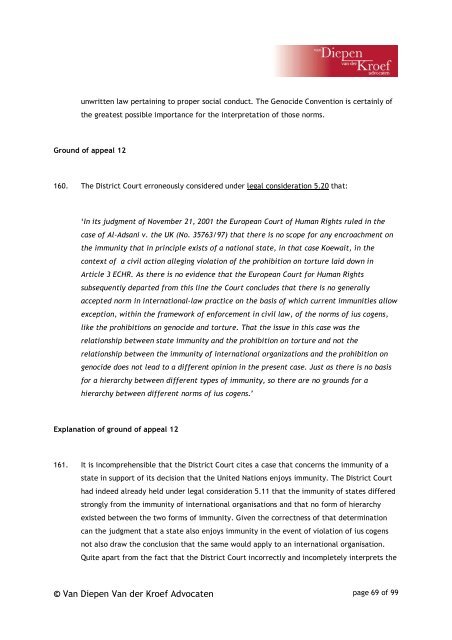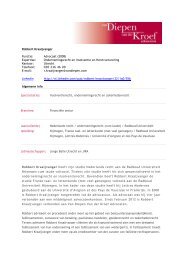© Van Diepen Van der Kroef Advocaten
© Van Diepen Van der Kroef Advocaten
© Van Diepen Van der Kroef Advocaten
- No tags were found...
You also want an ePaper? Increase the reach of your titles
YUMPU automatically turns print PDFs into web optimized ePapers that Google loves.
unwritten law pertaining to proper social conduct. The Genocide Convention is certainly ofthe greatest possible importance for the interpretation of those norms.Ground of appeal 12160. The District Court erroneously consi<strong>der</strong>ed un<strong>der</strong> legal consi<strong>der</strong>ation 5.20 that:‘In its judgment of November 21, 2001 the European Court of Human Rights ruled in thecase of Al-Adsani v. the UK (No. 35763/97) that there is no scope for any encroachment onthe immunity that in principle exists of a national state, in that case Koewait, in thecontext of a civil action alleging violation of the prohibition on torture laid down inArticle 3 ECHR. As there is no evidence that the European Court for Human Rightssubsequently departed from this line the Court concludes that there is no generallyaccepted norm in international-law practice on the basis of which current immunities allowexception, within the framework of enforcement in civil law, of the norms of ius cogens,like the prohibitions on genocide and torture. That the issue in this case was therelationship between state immunity and the prohibition on torture and not therelationship between the immunity of international organizations and the prohibition ongenocide does not lead to a different opinion in the present case. Just as there is no basisfor a hierarchy between different types of immunity, so there are no grounds for ahierarchy between different norms of ius cogens.’Explanation of ground of appeal 12161. It is incomprehensible that the District Court cites a case that concerns the immunity of astate in support of its decision that the United Nations enjoys immunity. The District Courthad indeed already held un<strong>der</strong> legal consi<strong>der</strong>ation 5.11 that the immunity of states differedstrongly from the immunity of international organisations and that no form of hierarchyexisted between the two forms of immunity. Given the correctness of that determinationcan the judgment that a state also enjoys immunity in the event of violation of ius cogensnot also draw the conclusion that the same would apply to an international organisation.Quite apart from the fact that the District Court incorrectly and incompletely interprets the<strong>©</strong> <strong>Van</strong> <strong>Diepen</strong> <strong>Van</strong> <strong>der</strong> <strong>Kroef</strong> <strong>Advocaten</strong> page 69 of 99
















